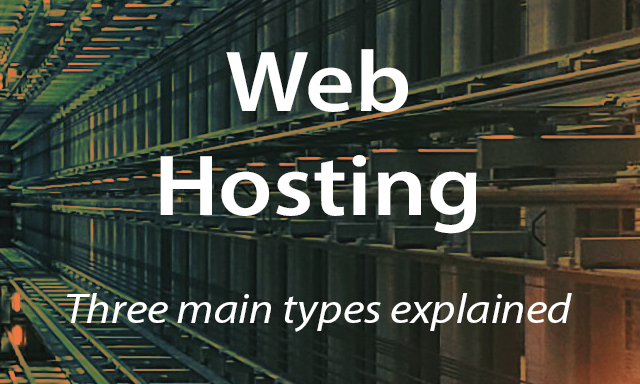The three main types of web hosting explained (2023)
Here we look at the different server types available to host your website.
One of many decisions you will face when looking to rent a server is what hosting solution best suits your needs. Choosing the correct server package to begin your venture can be confusing. The decision may not be as simple as you first thought, or you may not be aware of what options are available.
What this Blog covers
The purpose of this Blog is to provide an understanding of the three main server types of server available.
We will also include some examples of websites and the servers they match. This will hopefully prove beneficial in helping you make the right choice.
Firstly we recommend making yourself familiar with the jargon used by looking at our Server Hosting Jargon Blog.
To begin this blog will will first take a look at the differences between managed and unmanaged servers.
Managed Server Hosting
At Dx3Webs all server packages are managed by ourselves.
From shared to multiple Dedicated servers, we have you covered.
A managed server is a type of hosting where the provider is responsible for managing and maintaining the server. This includes all server associated software and hardware. Additionally tasks such as server configuration, software updates, security patches (not including Magento 2 patches), and monitoring are covered.
Managed hosting provides greater reliability, security, and support.
So what are the three types of server hosting?
Three main Server Types
There are three main types of servers available:
They are:
- Shared Hosting
- Cloud Hosting
- Dedicated Hosting
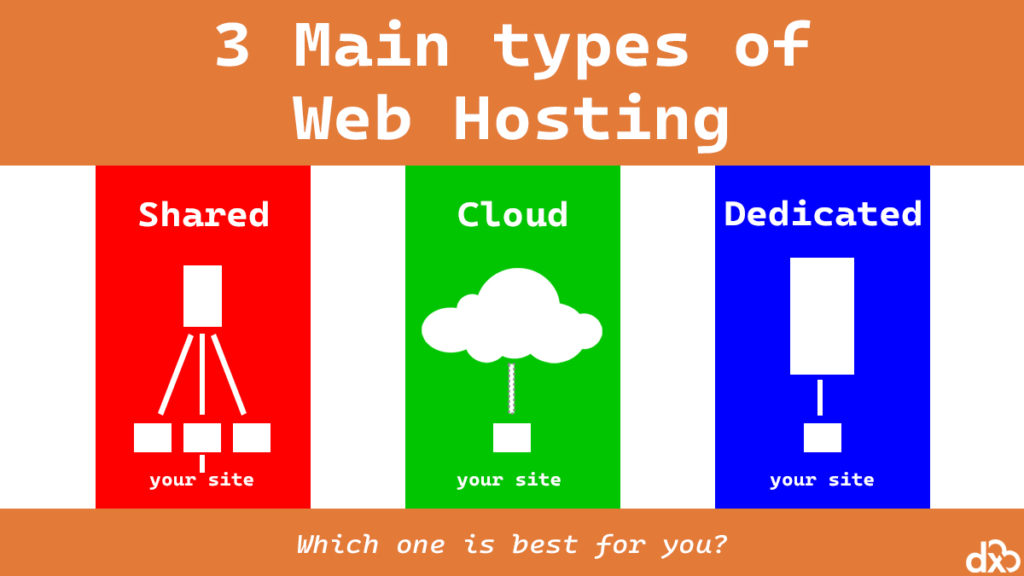
First up on our list is Shared Hosting.
Type of Server: Shared
As the name implies shared hosting is when multiple customers share the resources of a single physical server.
With shared hosting, customers are allocated a set number of CPU cores, disk space, bandwidth, and other resources.
As these resources are split between multiple customers, shared hosting is a great budget option.
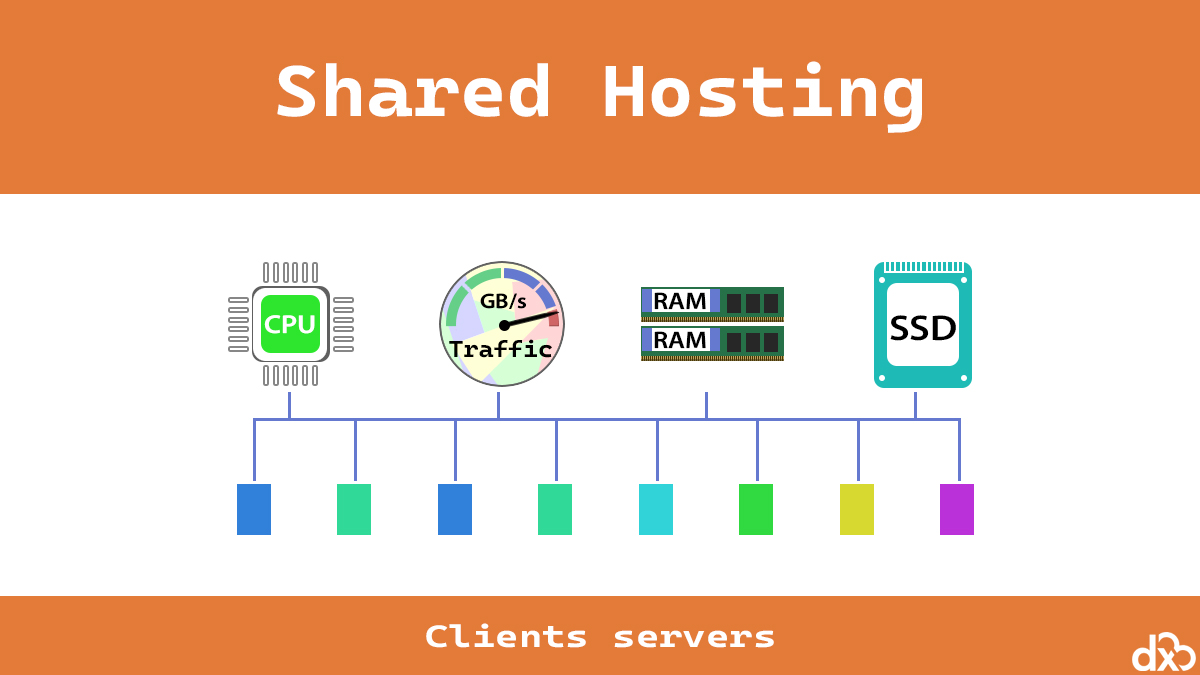
Shared Hosting: Pros
- Cost-effective: Shared hosting plans are typically more affordable than other hosting options.
- Easy to use: Shared hosting is user-friendly and easy to set up. A great option for those who are new to renting a server.
- Convenient: Dx3Webs (other providers may differ) provide a control panel that allows you to manage your website, email and other services.
Shared Hosting: Cons
- Limited Resources: Shared hosting plans often come with limited resources, such as storage space and bandwidth, which can cause issues if your website becomes more popular.
- Limited Customisation: Shared hosting plans usually have limited options for customisation. This can be a problem for websites that require specific software or configurations.
- Performance: As you share a physical server one customer may have a large spike in traffic resulting in performance issues for all customers on that server.
Examples of who would rent Shared Hosting Servers
- Bloggers: Bloggers who have a personal website or blog with limited traffic and don’t need a lot of customization.
- Small e-commerce sites: Small e-commerce sites that don’t have a lot of products or high traffic.
- Small online communities: Small online communities such as discussion boards or forums, that don’t have a lot of members and don’t require a lot of server resources.
Now lets have a look at a shared hosting package and the type of site it would be suitable for.
Example of a Shared Hosting Package
For this example we will use Dx3Webs WordPress standard hosting.
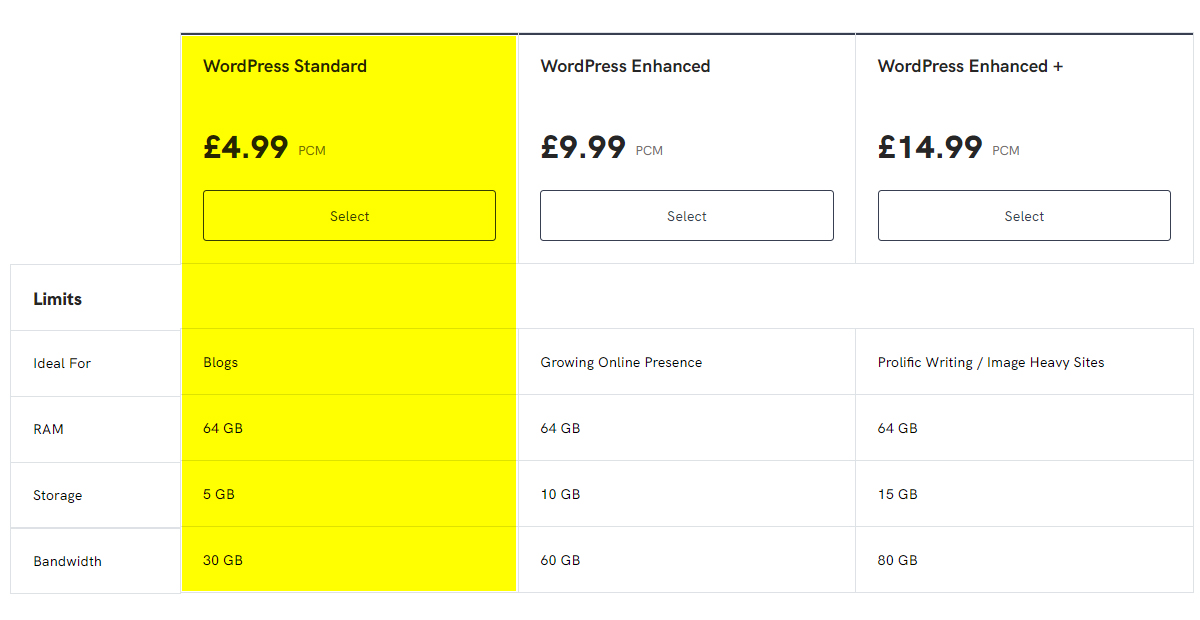
This package represents excellent value at only £4.99 a month and is more than enough to run your own Blog site.
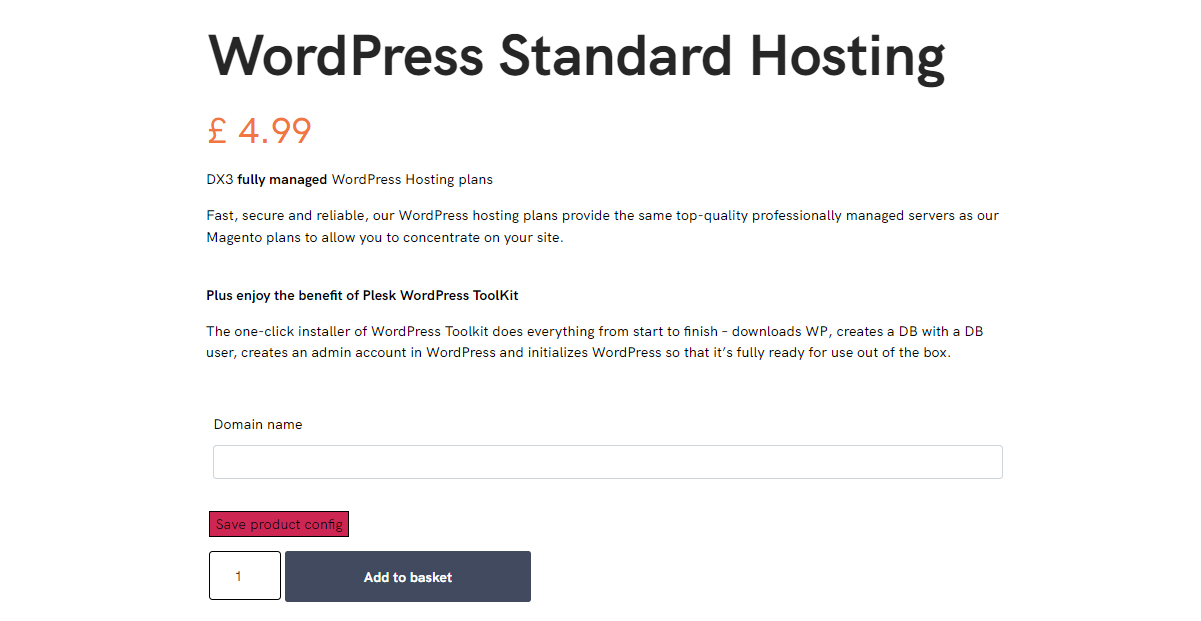
The WordPress Standard Package offers:
As you can see this type of package has more than enough CPU power with an Intel Xeon running at 4Ghz and a share of 64GB of RAM.
We see that there is a limit of 5GB Hard Drive storage and a Bandwidth limit of 30GB per month.
Each limit would represent a great many Blog Posts.
Just remember that static blog posts with images* are not resource intensive. However, if you intend to feature video content, hosted on the server, this will quickly use up resource.
The way around this is to host videos on a personal/business YouTube account, or other provider, and simply embed them in your own content. Videos will play “within” your Blog post, but are using YouTube’s bandwidth and not your own.
*just to clarify images can indeed be huge ! Images uploaded would usually be handled by software that automatically compresses them. The end result is not noticeable to your audience and limits the bandwidth used as your customers view them.
Now a look at cloud hosting.
Type of Server: Cloud
Instead of using a single, physical server, cloud hosting uses a network of servers that work together to handle the demands of a website. This allows for more flexibility, scalability, and cost-effectiveness compared to traditional hosting methods.
Cloud hosting allows users to access their resources (such as storage, memory and processing power) and only pay for what they use. This can be an alternative to the more expensive full dedicated server.
It also allows for more efficient use of resources and greater flexibility to scale up or down as needed.
Cloud hosting providers typically have a base price then allow more resources to be ramped up, if and when required.
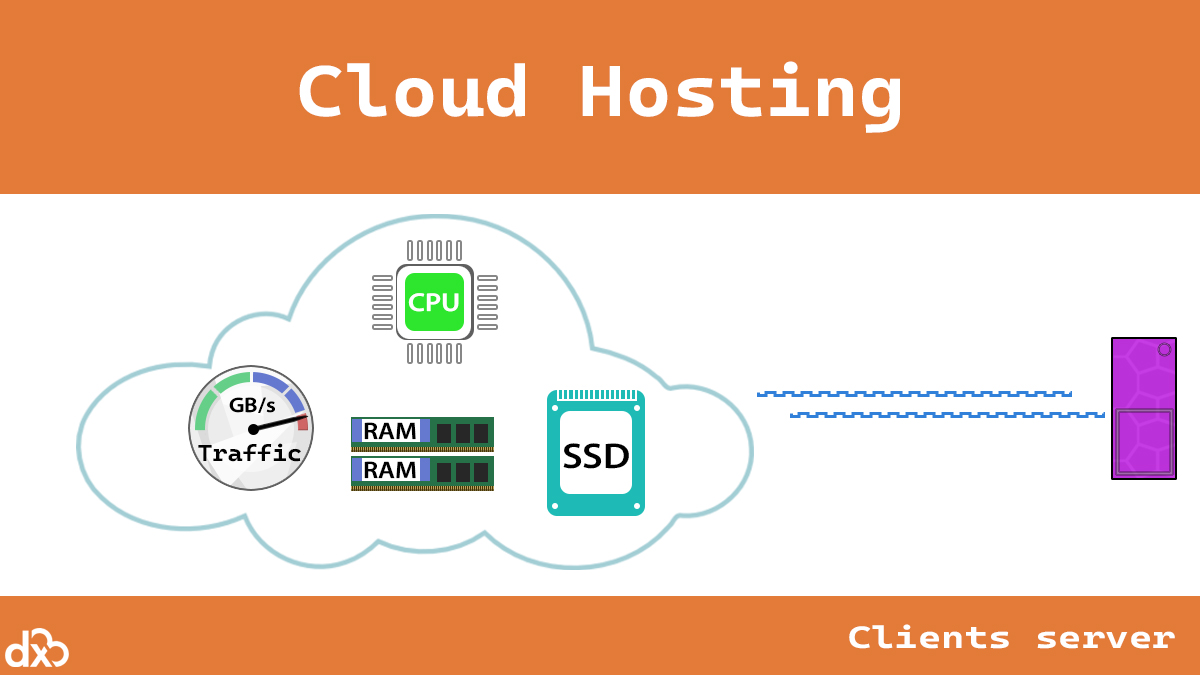
Cloud Hosting: Pros
- Scalability: Cloud hosting allows you to scale your resources up or down as needed, which can save you money in the long run.
- Cost Savings: Cloud hosting is often more cost-effective than traditional hosting methods. You only pay for what you use.
- High Availability: Cloud hosting providers often offer high availability, which means your website will have a higher uptime and lower risk of downtime.
Cloud Hosting: Cons
- Limited control: You may not have root access to the server and may not be able to customize the server environment to your liking.
- Cost: While cloud hosting can be cost-effective, it can also become more expensive if you need to scale up your resources significantly.
- Interruptions in service: Cloud hosting providers may experience outages or scheduled maintenance which can cause interruptions in service.
Examples of who would rent Cloud Hosting Servers
- Large businesses: Large businesses with high traffic websites and fluctuating resource needs.
- E-commerce websites: E-commerce websites that experience heavy traffic during peak seasons or sales.
- Media and Entertainment: Media and Entertainment companies that stream large amounts of data would benefit from the scalability and flexibility offered.
Now a look at who would rent a specific Cloud Hosting Package
Example of a Cloud Hosting Package
For this example we will choose Dx3Webs Magento Cloud Server DXV2 package.
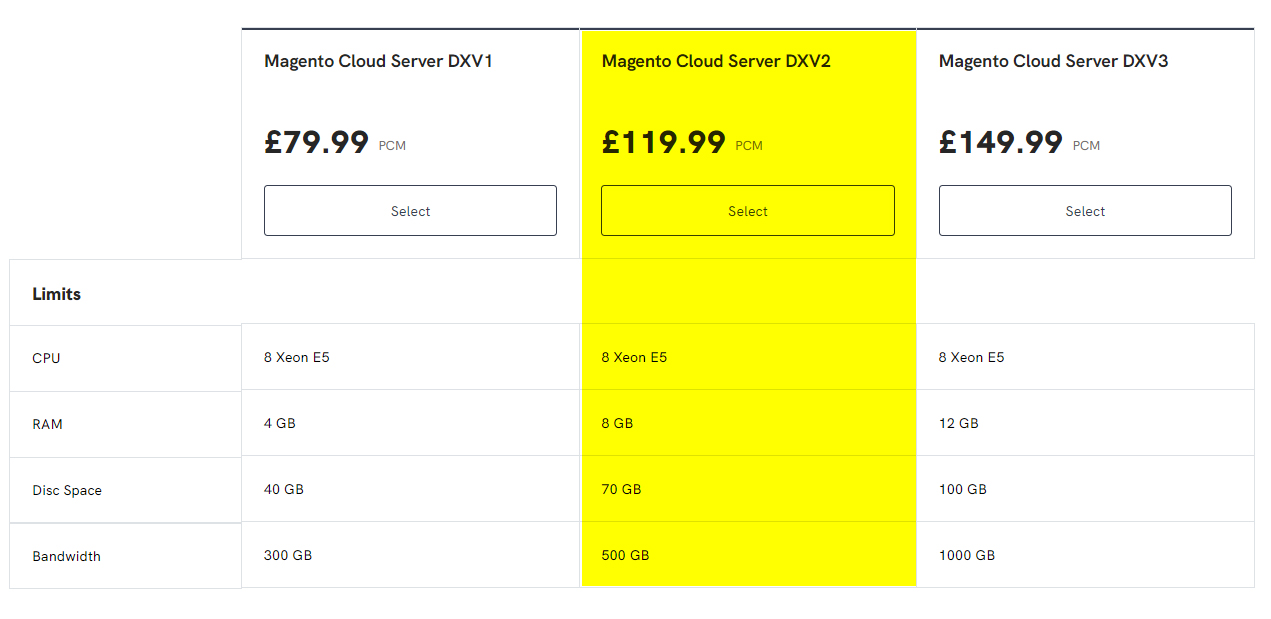
Sitting firmly between the the entry level and top tier products this offers great price to performance.
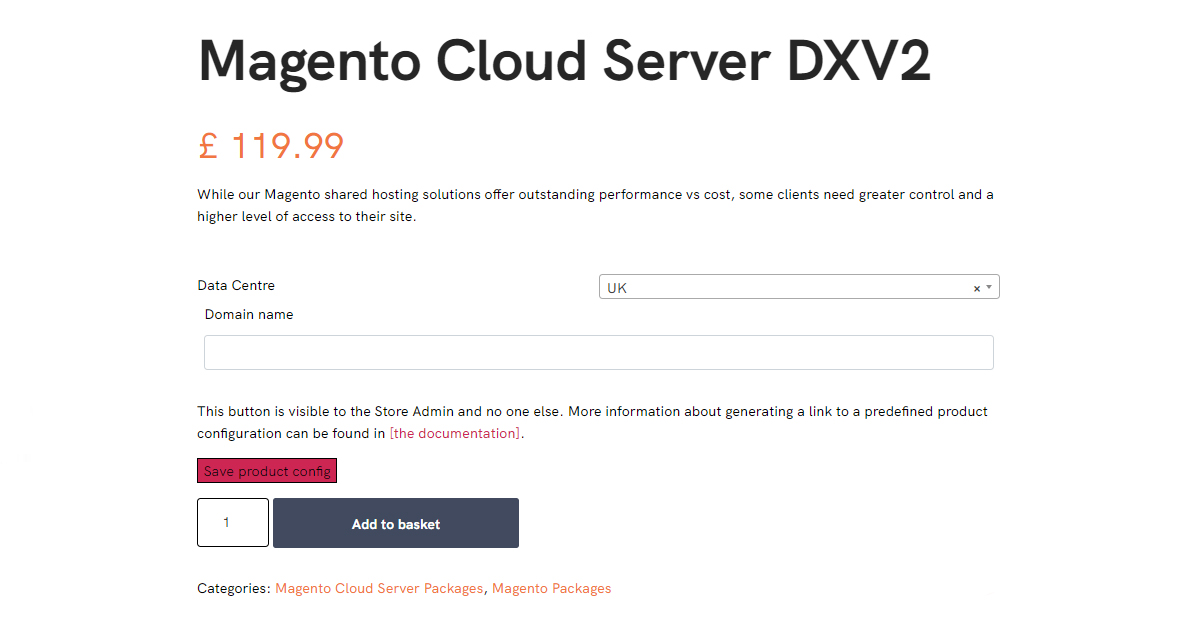
A great example that would fit the specifications would be a medium sized clothing store. The online clothing store would have a large inventory of products with high-resolution images, multiple categories, and a variety of customer reviews. The cloud-based server would be able to handle the traffic and storage needs of the website with 500GB of monthly bandwidth, 8GB of memory, and 70GB of disk storage. The 8 core Xeon would provide the necessary processing power to handle the checkout process and other backend tasks, ensuring a smooth customer experience.
Finally we have dedicated hosting.
Type of Server: Dedicated?
Dedicated hosting is a type of hosting service in which a customer rents an entire physical server from a hosting company. The server is not shared with any other customers, and the customer has full control over the server’s configuration and software.
Dedicated servers are typically used by large organizations, businesses, and eCommerce websites that require a high level of security, reliability, and performance. They are also useful for customers who need to run specific software or applications that are not compatible with shared hosting environments.
Dedicated servers are usually more expensive than shared hosting or cloud hosting, but they offer the highest level of flexibility, resources, and control.
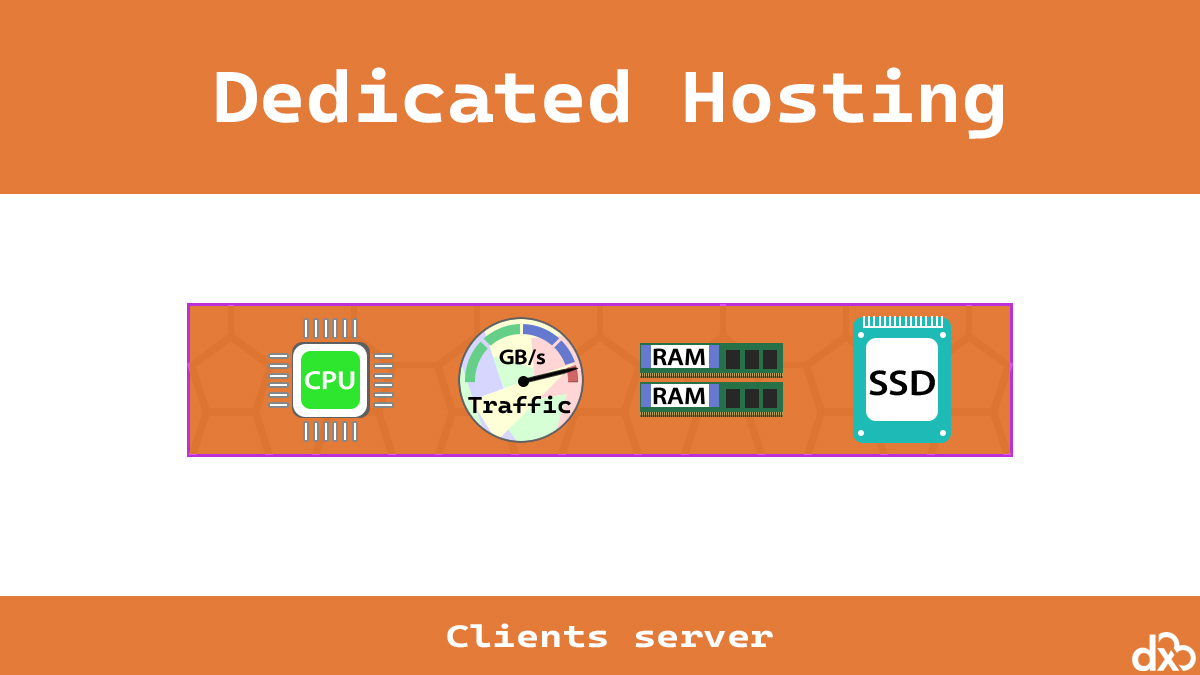
Dedicated Hosting: Pros
- High traffic websites: Websites with high traffic or large amounts of data would benefit from the resources and storage capacity of a dedicated server.
- Increased performance: Dedicated servers typically offer better performance as they are not shared with other websites, which can improve website speed and responsiveness.
- Greater control: With a dedicated server, you have full root access and control over the server, which allows for more customisation and flexibility.
Dedicated Server: Cons
- Cost: Dedicated servers can be more expensive than other hosting options.
- Technical expertise: Setting up and maintaining a dedicated server requires a certain level of technical expertise, which can be a challenge for those without the necessary skills or resources.
- Risk of data loss: There is always a risk of data loss or corruption with dedicated servers, even if you have multiple backups in place. Note: this is mitigated with off server backups as provided by Dx3Webs.
Examples of who would rent a Dedicated Server
- Large businesses and corporations for hosting their company websites and applications
- E-commerce businesses for hosting their Magento online storefronts and databases
- Individuals or small businesses with high traffic websites or specialised needs.
Finally a look at a dedicated hosting package and who might rent it.
Example of a Dedicated Hosting Package
For this example we have Dx3Webs top tier off the shelf Dedicated server, the Magento Dedicated Server DX5.
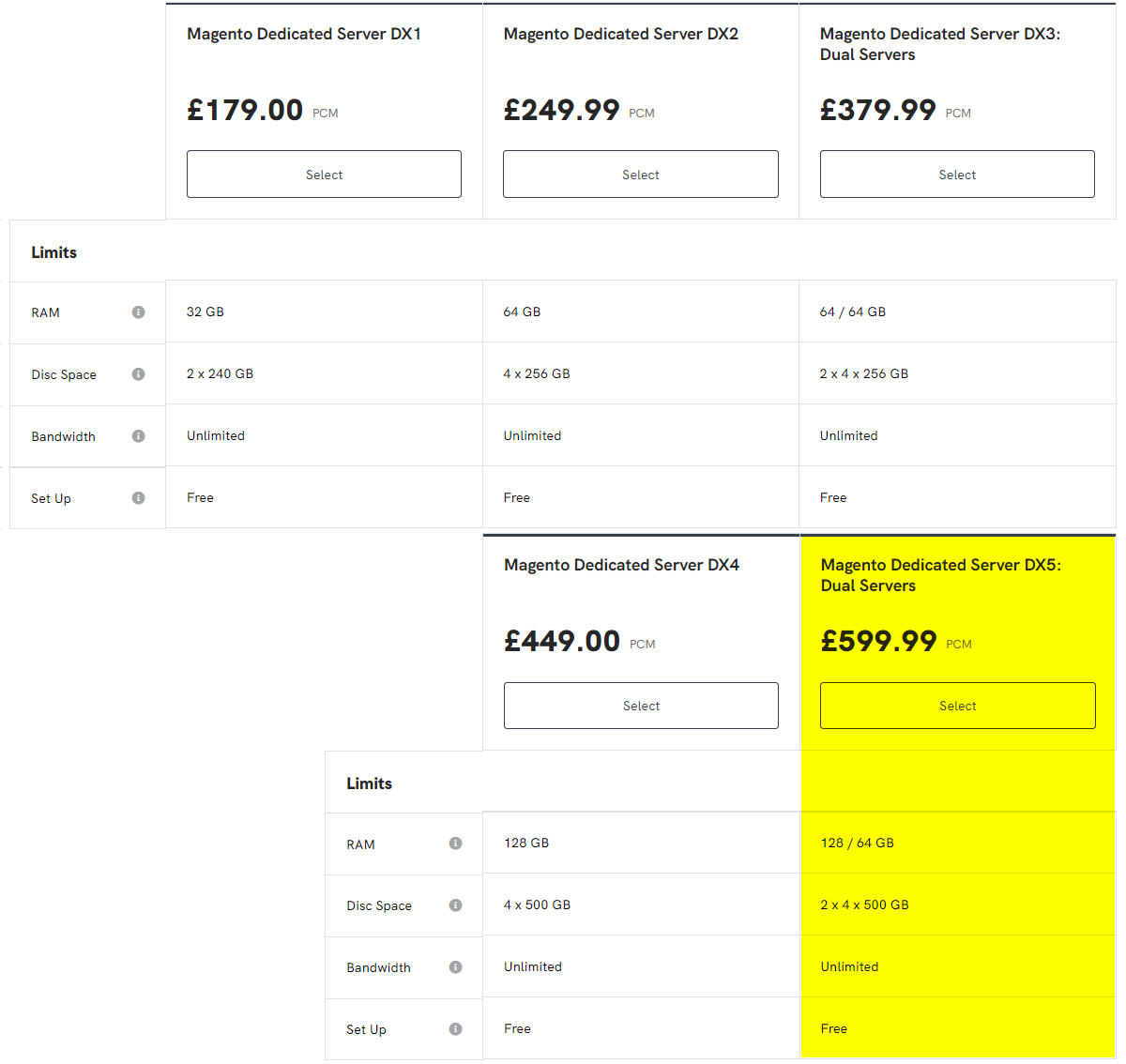
As you can see the specification for this type of dedicated server includes 128GB of RAM for the main server and 64GB for the separate database server.
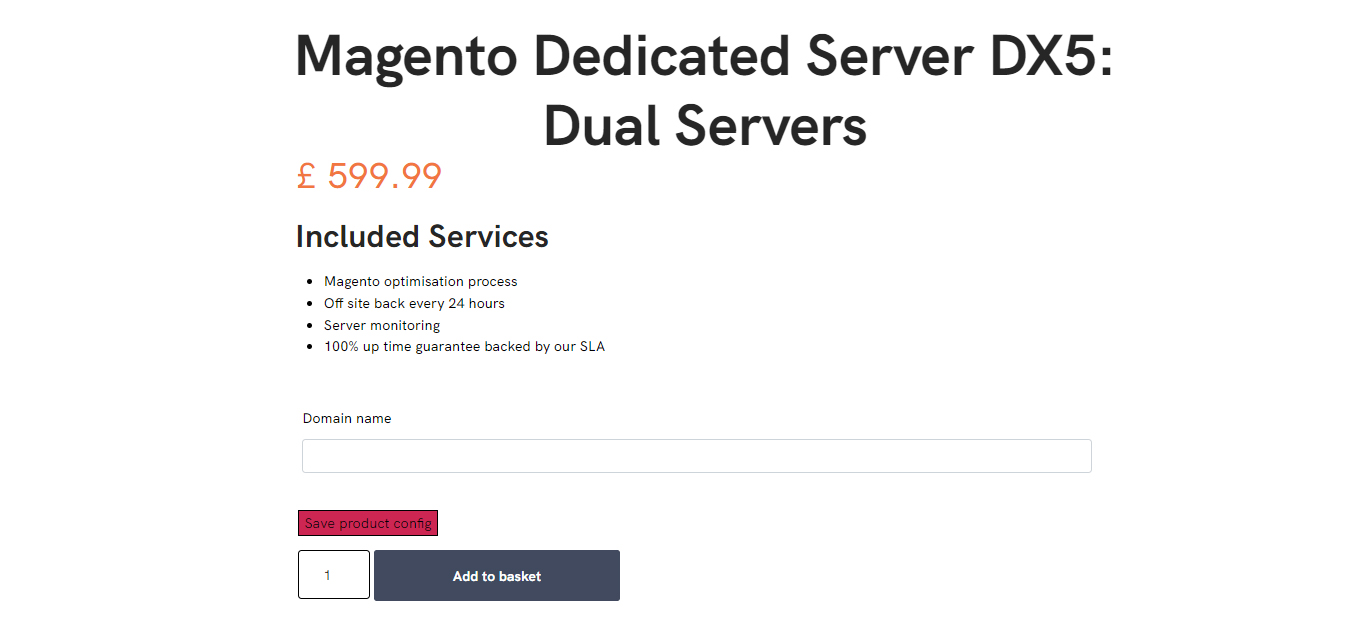
This level of server is more than capable of running something like an Electronics Magento eCommerce shop. This type of ecommerce store would have a vast product catalogue with multiple categories, various product specifications and comparisons, and a high volume of customer traffic.
With a 10-core 20-thread Xeon CPU, 128GB of RAM, and 4 SSD drives in a RAID 10 configuration, the server would have ample processing power and storage to handle the demands of the website.
The separate database server with an 8-core Xeon CPU, 64GB of RAM, and 4 SSD drives would ensure fast and efficient database operations, providing quick and reliable access to customer and product data.
This setup would ensure that the online store can handle large amounts of traffic and provide a fast and responsive shopping experience for its customers.
Finally, just what server hosting package is right for you.
Conclusion: Choosing the correct server package
We hope this Blog gave you some idea of the various types of server available to host your site.
The choice of server hosting depends on the specific needs and requirements, from a blogging site to an ecommerce superstore.
For small to medium-sized businesses Shared and lower tier Cloud Hosting may be sufficient, providing basic server resources at a low cost. For larger businesses, more complex cloud-based and dedicated server hosting may be more suitable, providing more storage and bandwidth to meet your requirements
We learnt that Shared hosting provides an excellent cost effective solution while Cloud-based hosting provides scalable resources and the ability to quickly add more capacity as needed. Finally dedicated hosting provides the highest level of performance and control over the server resources.
If you are looking for a host we always recommend contacting the server provider and discussing your exact needs. At Dx3Webs any package you see listed can be developed around your specific requirements.
For further information about our own hosting packages please don’t hesitate in contacting us on: 0800 033 7453 or email us at info@dx3webs.com and a representative will get back to you.
Our experienced team can help you assess your needs and provide guidance on the best server hosting solution for your business.

